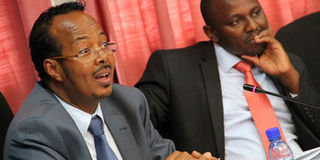Breaking News: At least 10 feared to have drowned in Makueni river
Taxpayers to pay twice as two teams of MPs probe tender

Public Investments Commitee Chairman Adan Keynan (left) with his Vice-Chair Kimani Ichung'wa during the committee's probe into declining government of Kenya shareholding in Telkom Kenya Limited on September 19, 2013. Two National Assembly committees will get down to work starting on January 15, 2014 as the embargo on meetings by Speaker Justin Muturi comes to an end and legislators resume work. PHOTO | FILE
What you need to know:
- If both committees meet concurrently, the taxpayer will end up paying double sitting allowances for MPs meeting the same sets of government officials to talk about the exact same subject
- The Speaker also ruled out chances that PIC could have joint sittings with the Transport or any other departmental committee
- Mr Muturi said the job of the Departmental Committees extends to government departments “and should not be confused with state corporations.”
- The committees’ investigations have been marked by whispering that some MPs are acting on behalf of businessmen who represent Chinese firms that would have loved to get the contract themselves
Two National Assembly committees will get down to work starting on Wednesday this week as the embargo on meetings by Speaker Justin Muturi comes to an end and legislators resume work.
The Public Investments Committee and the Transport Committee will separately be meeting government officials and individuals connected to the contract for the construction of the standard-gauge railway.
While the parallel meetings are likely to offer useful insights and facts about the contract, the two teams’ activities have thrown into sharp focus the apparent confusion in the House over the mandate of committees.
If both committees meet concurrently, the taxpayer will end up paying double sitting allowances for MPs meeting the same sets of government officials to talk about the exact same subject.
Every time they attend these meetings, committee chairmen earn Sh10,000, vice chairmen Sh8,000 and ordinary members Sh5,000.
The Transport Committee has 29 members while PIC has 27. Each has a chairman and a vice chairman.
If all members of the committees show up for the meetings, the Parliamentary Service Commission will pay out Sh153,000 for every day PIC meets and Sh143,000 for every day the Transport team meets.
QUESTIONS RAISED
The National Assembly got to this position over November and December last year when two MPs separately asked the same question.
First was Hezron Awiti Bolo (Nyali, Wiper), who on November 14 requested a routine statement from the chairman of the Transport, Public Works and Housing Committee.
“I would like to know why the Government single-sourced and awarded the tender to China Bridge and Road Construction Company," he said. "I would also like to know whether there was due diligence by the Government of Kenya done on the China Bridge and Road Construction Company to build the railway.”
He ended by stating that the Majority Leader should issue the statement but later clarified that he actually meant the chairman of the Transport Committee, Starehe MP Maina Kamanda.
On December 4, a day before Parliament started its Christmas break, Narok South legislator Korei Lemein (URP) asked a similar question.
He wanted to know “the actual cost of the project and the sources of funds, whether the procurement process and the legal requirements were followed in awarding the tender and the list of all the tenderers and their financial and technical evaluation reports.”
Mr Lemein also wanted to know “the sustainability and cost effectiveness of the project, clearly defining the safeguards put in place to ensure the contract sum is sustained and finally, the environmental impact assessment of the project.”
He asked Majority Leader Aden Duale to provide the statement but Mr Duale baulked, saying: “It should go to the relevant committee to do an in depth investigation, that is either the Committee on Transport, Public Works and Housing or the Committee on Public Investments. I think it is more about investment.”
CONFUSION OF ROLES
The Speaker immediately ordered PIC to undertake the investigations and gave his considered ruling the following day.
Mr Muturi said the job of the Departmental Committees extends to government departments “and should not be confused with state corporations.”
He said this entails matters such as “review of pieces of legislation, vetting of appointments or matters of administration of ministries or state corporations.”
Referring to the Standing Orders, Mr Muturi said PIC is allowed to examine, considering the autonomy and the efficiency of public investments, whether their affairs are being managed “in accordance with sound financial or business principles and prudent commercial practices.”
The Speaker also ruled out chances that PIC could have joint sittings with the Transport or any other departmental committee.
“I also will not expect a joint sitting of either the Public Accounts Committee or PIC with a Departmental Committee as their mandates are very distinct,” he said.
This placed in the committees in the current circumstances; where the Transport Committee is continuing an investigation it started while PIC is acting on the direction of the Speaker.
STOOGE MPs
The committees’ investigations have been marked by whispering that some MPs are acting on behalf of businessmen who represent Chinese firms that would have loved to get the contract themselves.
Others are reported to be keen because the Chinese government prefers to have Chinese companies implementing the contracts they have funded through loans. It is believed that some firms felt China Road and Bridge Corporation shouldn’t have gotten the job.
Members of the Transport Committee were reported to have been angry at the Speaker because his ruling suggested that they should limit their work to vetting nominees and asking about policy directives by the ministry.
By stating that they shouldn’t extend their oversight to state corporations, they said, the Speaker had rendered them toothless because a lot of the work in ministries such as Transport is carried out by state corporations.





